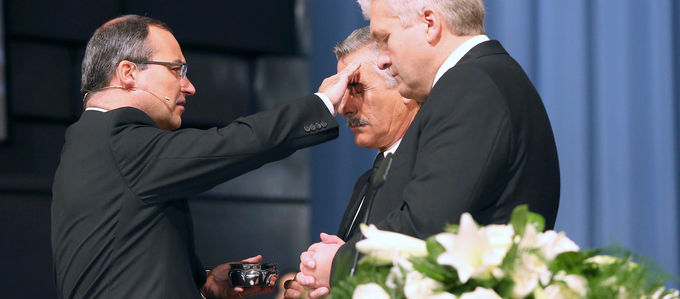
Is the divine service for the departed some sort of spiritualistic practice? Hardly! Anyone who claims such a thing would be contradicting the facts! After all, scholarship sees these two as polar opposites in several decisive points.
The congregation prays while two men stand at the altar. In silence they receive a consecrated wafer. That is what service for the departed means, namely standing in service to God.
Tables move, pendulums swing, or an ecstatic voice speaks in otherworldly tones. This is what Spiritualism is all about: summoning the departed and investigating the realm of the dead.
“Spiritualism is the study of the manifestation of spirits identifying themselves through certain codes or mediums, and proving their existence to living relatives by leaving behind communication, instructions, or threats, which are interpreted by a medium.”—So reads an authoritative definition from the Theologische Realenzyklopädie [Theological Encyclopaedia] , the last word in specialist reference works.
Spiritism in the Old Testament
Already in the Old Testament we can find examples of such efforts to conjure the dead. In Israel’s pagan environment, these rituals were part of religious practice. The account of the witch of Endor is well known: at the request of the desperate King Saul, the medium conjures up the prophet Samuel. In the end, however, the latter only appears in order to proclaim that God has rejected the king.
This sort of idolatry was forbidden to the people of Israel: “When you come into the land which the Lord your God is giving you, you shall not learn to follow the abominations of those nations,” we read in Deuteronomy 18: 9–11. This prohibition from God applied to anyone who “practises witchcraft, or a soothsayer, or one who interprets omens, or a sorcerer, or one who conjures spells, or a medium, or a spiritist, or one who calls up the dead.”
Spiritualism in the modern age
Modern Spiritualism emerged in the nineteenth century as a stated counter-trend to the materialism of that era, which endeavoured to break down everything in existence—including things pertaining to the spiritual domain—into its material constituents. The movement sought to prove the existence of the immortal soul by conjuring the dead. The afterlife and the beyond thus became the object of scientific inquiry, as it were.
Interviews purporting to ask questions of the departed would take the form of so-called séances, group meetings in darkened rooms. The responses from the beyond to the questions of the participants were provided by a medium, a person who allegedly possessed a gift for this practice, or through signs such as moving tables or glasses, knocking noises, and various kinds of devices in which an object pointed to letters, numbers, or symbols.
Contrasting opposite poles
This clearly demonstrates the contrast between Spiritualism and our Church’s understanding of salvation for the departed:
- Spiritualism seeks to enter into direct contact with the dead using any means at its disposal. Our understanding of salvation for the departed does not allow for direct contact of any kind with the dead.
- Spiritualism seeks to communicate with the dead by way of a series of questions and answers. Our conception of salvation for the departed does not seek any such exchange.
- Spiritualism seeks to explore the state of the soul and the conditions of the beyond. Our understanding of salvation for the departed acknowledges the hereafter as a domain that remains incomprehensible and inaccessible to us.
- In Spiritualism, people act on the basis of the selfish motive of curiosity. In the concept of salvation for the departed, human beings act in service to God and their neighbour.
One big community
The New Apostolic understanding of salvation for the departed must also be clearly distinguished from ancestor worship, which can be found primarily in Africa, but also in parts of Asia and among the indigenous peoples of Australia. The ancestors are deceased persons from whom a person, group, or people descends. These ancestors define the identity of such persons or groups, and are, in turn, worshipped by them.
Here too, there are many contrasts:
- in ancestor worship, the ancestors are considered mediators between human beings and various deities. Christianity assigns the role of Mediator to Jesus Christ alone.
- in ancestor worship, ancestors are considered role models for the conduct of the living. In Christianity, the role of example applies exclusively to Jesus Christ.
- in ancestor worship, the ancestors define the identity of the people. In Christianity, the new creation in Christ defines our new identity.
One way or another, our Church’s understanding of salvation for the departed brings God’s will to save—which incorporates both the living and the dead—to clear expression. The intercessions of the living and the dispensation of the sacraments reflect the certainty that the dead and living comprise one big community of human beings in need of salvation, and that the church of Christ itself is a single great fellowship comprised of both the living and the dead in Christ.
Photo: freshidea – stock.adobe.com













